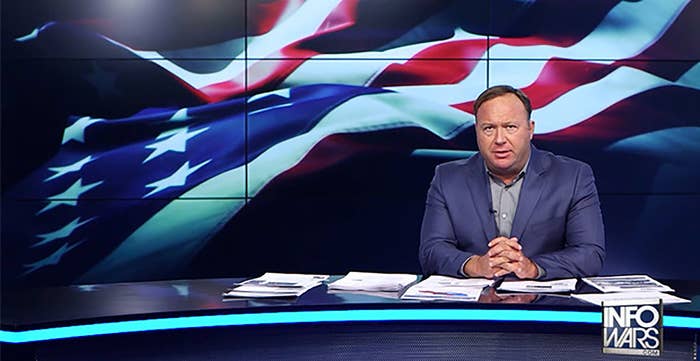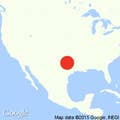
AUSTIN — Halfway through the second official day of his 10-day civil custody trial, Alex Jones reclined in his chair and mopped sweat from his brow while watching a shirtless, pantsless version of himself hawk male vitality supplements on a courtroom television screen. It was hardly the most outlandish moment of the afternoon.
Indeed, the first full day of Jones’ battle to retain custody of his three young children was filled with bizarre allegations — claims that Jones took his shirt off during a joint family counseling session and once blamed his inability to recall basic facts about his children during a pretrial deposition on having “had a big bowl of chili for lunch."
The news from the Travis County courtroom — breathless tweets from a gaggle of journalists covering the trial — bled across the internet instantly. Since Sunday evening, when the Austin American Statesman broke the news that Jones’ attorneys planned to defend his custody on the grounds that his two-plus decades of conspiracy theorizing has been “performance art,” Alex Jones' name and reputation have unexpectedly become one of the biggest stories in the country.
And while it’s unusual for a contentious family custody case to end up as fodder for late-night television hosts (the Jones case got the extended Colbert monologue treatment on Monday evening), Jones’ trial is far larger than his painful and in some ways ordinary family dispute. For the millions on either side who both adore and revile Jones, the case offers the hope of answering a near-impossible question: Where does Alex Jones the character end and Alex Jones the person begin?
But the herculean task of untangling Jones from his political views has put the 43-year-old broadcaster at the center of something bigger than himself. Unexpectedly, Jones is now the star of a courtroom drama that feels less like a quotidian family law case and more like a referendum on politics, the internet, and the media in the post-Trump ecosystem.
And that’s because at present Jones and his Infowars media empire sit at the intersection of the thorniest issues across the media landscape. Jones, depending on who you ask, is either a participant in, defender of, or the driving force behind everything from fake news, online harassment, and conspiracy theories to the toxic, hyper-partisan politicization of seemingly innocuous events.
Which is what makes Jones’ trial — and his impending trip to the witness stand — so alluring. Perhaps less interesting than knowing exactly what Jones truly believes is the prospect of watching legal experts compel earnest testimony from one of the nation’s top exporters of loose facts, untruths, and partisanship. Jones’ unenviable position then — disavow your lucrative professional views or risk losing your family — feels like a rare shot at the truth at a time when disinformation and professionalized trolling are staples of both sides of the political spectrum.
And while Jones’ verdict will likely set few precedents when it comes to internet conspiracy theorizing, the national scrutiny is bound to imbue even the smallest rulings with added meaning. Jones’ performance art defense resonates deeply during a month in which CNN’s President Jeff Zucker prompted outrage by comparing political news coverage to a sporting event. Similarly, Judge Orlinda Naranjo’s decisions to admit or disallow Jones’ rants into evidence seem — perhaps unfairly — referendums on fake news. Mix in the trial’s custody element and the case’s rulings grow unanswerable and near existential to an outside observer: Can someone who traffics in fake news simultaneously be a good father? Just how amoral are conspiratorial thoughts when they’re published for a wider audience?
And because Jones and the Infowars empire are creatures of the internet, the trial stands to put the engines and platforms of information distribution on trial in unexpected ways. On Tuesday there was confusion in the court as to whether Jones’ impromptu Facebook Live streaming videos — which depict him shouting at protesters and slurring words ahead of Donald Trump’s inauguration — should be classified as part of Jones’ professional life or if they were videos of a more personal nature, given that they weren’t shot in studio. There’s even a debate to be had over the legal sincerity of certain online threats. Jones’ parenting, for example, was called into question Tuesday by the opposing counsel for him bringing his 14-year-old son on to his streamed radio show after having received death threats online during his broadcasts.
And if you’re looking to understand how alternative political and factual universes respond to news about polarizing figures, the first two days of Jones’ trial have been highly instructive. Jones’ attorney’s performance art defense was met by the mainstream media as an ideological checkmate of sorts, while his defenders reflexively blamed the claims on a deeper, more sinister conspiracy. Jones himself denied the rumors and claimed that the media was doing to him what they claim he does: Take a kernel of truth and spin it to fit a convenient fake news narrative. Jones’ critics react incredulously while his fans argue it’s unfair to politicize what should be a private family matter. All sides talk past each other, ignoring the other and assuming they've won.
I am taking sheer delight in Alex Jones having to admit over and over again that he's a fraud.
@JackPosobiec Just flipped between CBS NBC and ABC. All ran the same fake Alex Jones story within 10 min of eachother. #veryfakenews
This local custody trial is not supposed to be about Alex Jones. And yet his centrality to the proceedings is unavoidable. Still, despite the fact that this is at its core a family matter and an examination of Jones’ dueling personae, it is hard to shake the feeling that there’s something greater looming over these 10 days. This is the 21st-century media’s Scopes Monkey Trial (we are the lower primates here, not the earnest schoolteacher), and the trial’s symbolic meaning will overshadow its subjects, its litigants, and even its verdict. Instead, it is standing in as a referendum on a divisive moment, to be interpreted differently by all who follow along. Trials with media personalities highlight this further. Last year’s Hulk Hogan lawsuit against Gawker Media was largely viewed as a condemnation of a bygone era of sensationalist online writing and reporting. And in its own overdetermined way, Jones’ trial, coverage, and fallout feels a bit like a trial for the media — with all its attendant volatility and uncertainty and toxicity — in the year 2017.
We are riveted to our olive-green, cushioned seats in the gallery of the Travis County Courthouse this week because of Jones’ profound influence — both intentional and unintended — on politics, culture, and a conspiratorial ideology of fear that transcends party lines. The case of Jones v. Jones resonates so deeply at this moment because we are living in a moment that Alex Jones himself ushered in.
Outside Your Bubble is a BuzzFeed News effort to bring you a diversity of thought and opinion from around the internet. If you don't see your viewpoint represented, contact the curator at bubble@buzzfeed.com. Click here for more on Outside Your Bubble.

